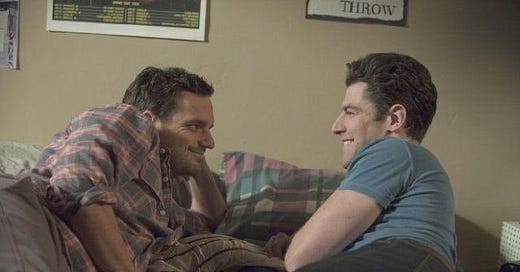Happy Monday!
Here’s what I have for you today:
What I’m reading
Quotations
Tweets
Voila.
What I read this week:
Monochords, Yannis Ritsos, tr. Paul Merchant1
Queer and Mumbling: Fragments of Philosophical Faggotry, Yvonne Lebien2
Dare Me, Megan Abbott3
To read:
Quotations:
I saw you, and remembered poems.
-Yannis Ritsos, tr. Paul Merchant
Perhaps only silence can tell the whole truth.
-Yannis Ritsos, tr. Paul Merchant
How can the flag and the poem be twins?
-Yannis Ritsos, tr. Paul Merchant
The deeper the gaze, the more tight-lipped the mouth.
-Yannis Ritsos, tr. Paul Merchant
I create lines to exorcise the evil that overcame my country.
-Yannis Ritsos, tr. Paul Merchant
Which words and how many, to speak my silence, so it can be silent at last?
-Yannis Ritsos, tr. Paul Merchant
I struggle when I read essays like this, and there are so many, about how difficult marriage is, about how true commitment is measured by one’s willingness and capacity to endure suffering by way of incompatibility or growing apart or the small betrayals that can accumulate over the course of a marriage or other long term relationship. I cannot relate to such profound unhappiness in marriage. And I want better for anyone who carries more sadness than joy by staying with the a partner they don’t like and/or love and/or want to be with.
I don't think influencers will ever materially affect the beauty industry in terms of lessening consumerism. That’s antithetical to their jobs. The de-influencing trend is, in some ways, actually a tactic for securing their jobs as influencers. Being “honest” with your audience about products that you don’t like builds trust. It makes the audience think, Hey, this person is not just trying to sell me stuff, so when they do eventually promote a product they like, I can believe what they say. The audience is now primed to buy products from them later on.
-Jessica DeFino on de-influencing
How do we emphasize that pure pleasure in poetic language—and make sure that pleasure is the ultimate goal?
-Yvonne Lebien
At some point, “queering” academic language necessitates that you no longer write it. Use of academic jargon is an inherently exclusionary, patriarchal act, predicated on medieval forms of cultural elitism and hyper-escalated by advertising culture under capitalism. At some point, why even worry about changing that language to be more inclusive? Why not just stop using it entirely?
-Yvonne Lebien
Academic culture is inextricably linked to capitalism and advertising. Artists put more passion into earning and curating academic and thus economic credentials than into communal creation with other artists. Because academia is run like a business, the more we use academic terms to describe ourselves the more our narratives are only meaningful in the logic of capitalist individualism. On the surface level, it can be empowering to legitimize our experiences within academia, but then we start to advertise our freakishness, we have to present our freakishness within a resume in every art piece, as if applying for a corporate position. But queerness is not a corporation.
-Yvonne Lebien
Art [under capitalism] is less about finding a genuinely unique voice and more about fitting into a content-production system that mass-produces narratives of individualism.
-Yvonne Lebien
Academia let me do all the bad things I’d wanted an excuse to do: it allowed me to isolate myself by romanticizing isolation, it allowed my neuroses to bloom within a culture of intellectual persecution and paranoia, it allowed me to inhabit a sadistic fantasy based on power hierarchies of individual uniqueness. Academia is driven by a persecution complex.
-Yvonne Lebien
Perhaps the political separation we enforce, the idea that you can only understand a work of art or a theory by removing yourself from it completely, is actually what is leading us to totally misunderstand them. Perhaps that’s the fakeness: this performance of scientific rigor.
-Yvonne Lebien
Institutions like academia, publishing, and education are built on the whims of American oligarchic wealth.
There’s something dangerous about the boredom of teenage girls.
-Megan Abbott
Did I ever feel anything at all until she showed me what feeling meant?
-Megan Abbott
I feel weak and desecrated.
-Megan Abbott
It’s something you feel constantly, the thing you fight off all the time. The knot of hot boredom lodged behind your eyes, so thick and grievous you want to bang your head against the wall, knock it loose.
-Megan Abbott
Maybe all we’re trying to drown out is the terrifying quiet, the sense that all there is to hear is our own thin echoes.
-Megan Abbott
Tweets:





Have a great week—
-Despy Boutris
Instagram
Twitter
Website
Shop
Good read, though I resent the fact that the publisher didn’t include the original Greek within the book.
I always love the texts GenderFail puts out, & I recommend this one for anyone who has resigned from wanting to be an academic (or who saw the toxicity within the University [&, by extension, professors & would-be professors] even before then). It’s also for anyone with an interest in language & poetry & community & philosophical musings.
I watched the TV show (cancelled after one season—sob!) amid quarantine. The book is so good, too—and a lil more explicitly gay, which is very fun.










